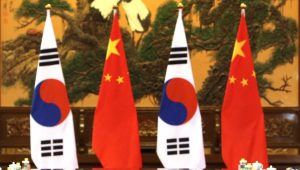By Gabriela Bernal
 Seoul may be rethinking its relations with Beijing, according to recent developments. This is significant given the lack of diplomatic engagement between both nations for quite some time.
Seoul may be rethinking its relations with Beijing, according to recent developments. This is significant given the lack of diplomatic engagement between both nations for quite some time.
South Korea’s recently inaugurated unification minister, Lee In-young, directly reached out to China this week, asking the Chinese to play a “constructive” role in the resumption of inter-Korean talks. Lee made the remarks during a meeting with China’s ambassador to South Korea, Xing Haiming.
Lee took the opportunity to praise China for its efforts regarding issues on the Korean Peninsula and expressed his hope for continued bilateral cooperation on such issues in the future. He also called on China to support his plans to “develop inter-Korean relations into a peaceful, economic and biotic community” through various South Korean-led economic and social projects.
The Chinese ambassador welcomed Lee’s remarks and also expressed his country’s intent and continued commitment to denuclearization, peace, and the eventual reunification of both Koreas.
Given the continued stalemate in U.S.-North Korea talks and lack of progress on the inter-Korean relations front, Seoul might be trying to adopt a different approach in dealing with North Korea: trying to get back on China’s good side.
But it remains to be seen whether such a strategy will prove fruitful in the medium to long term. China has not been as cooperative as Seoul had hoped in the past concerning denuclearization efforts on the peninsula, and China continues to argue it in fact has little influence over how the regime in Pyongyang acts.
Still, there may be cause for cautious optimism. Besides the meeting between the unification minister and Chinese ambassador, another high-level meeting between South Korean and Chinese officials took place this week.
China’s top diplomat, Yang Jiechi, arrived in Busan on Friday to meet with his South Korean counterpart Suh Hoon, the director of the of National Security Office. The visit is believed to have been scheduled to further map out the details of a summit between Presidents Xi Jinping and Moon Jae-in later this year, among other things.
A summit between both leaders was intended to be held much earlier, but was delayed due to the pandemic. If things go well, Xi and Moon could meet in person later this year and possibly take meaningful steps to improve their strained relationship.
South Korea’s economy, like most countries around the world, has been hit hard during the course of this pandemic. A summit with the Chinese president could provide Seoul with the opportunity to not only mend diplomatic relations, but also open doors that could lead to increased economic cooperation.
South Korea’s relations with China have been rather stuck for the past few years ever since Seoul accepted a U.S. missile defense system to be deployed on South Korean soil in 2017. As a response, China — which claimed the system’s radar could be used by the United States to spy on China — retaliated economically against South Korea.
A nationwide boycott ensued targeting South Korean products and stores, such as the giant Lotte chain. South Korea’s tourism industry also lost billions of dollars when Chinese tourists stopped coming. In fact, Chinese tour groups to South Korea were banned outright, which alone led to an estimated revenue loss of $15.6 billion in 2017.
But time has passed since then, and the diplomatic and economic relations between both countries may be able to drastically improve soon. With only two years left in office, Moon must look at alternative ways to make both diplomatic and economic gains for his country. Improving relations with China may be one of those ways.
Gabriela Bernal is a Korean affairs analyst based in Seoul, South Korea. She is a Ph.D. candidate at the University of North Korean Studies and a translator for Daily NK.
No comments:
Post a Comment